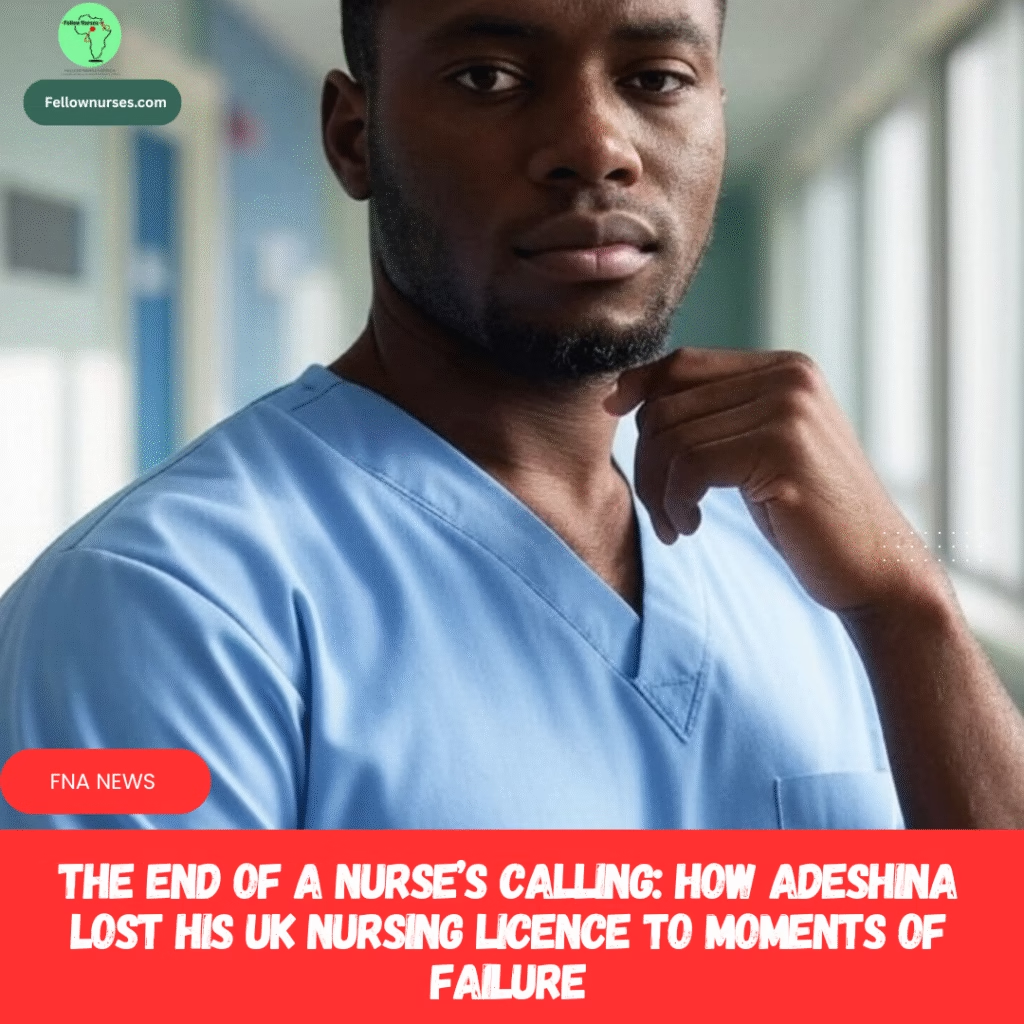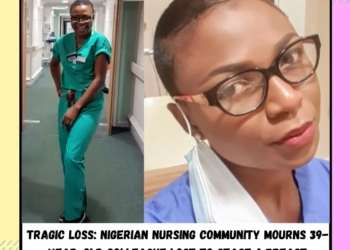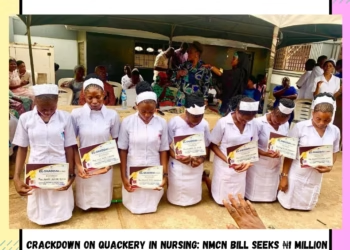
The End of a Nurse’s Calling: How Adeshina Lost His UK Nursing Licence to Moments of Failure
By Fellow Nurses Africa
Published: September 5, 2025
In the noble pursuit of nursing, where compassion meets duty, we often share stories of courage and care that define the profession. Today, with heavy hearts, we recount a somber tale—that of Adeshina, once a beacon of hope in mental health care, whose career crumbled under the weight of tragic missteps. This is the story of a nurse whose moments of failure led to the loss of his UK nursing licence, leaving a legacy of lessons and sorrow.
When Trust Was Broken
For nine years, Adeshina worked as a ward manager at The Priory Hospital Enfield in North London. It was a big job, looking after people with serious mental health challenges, many held under the Mental Health Act. As African nurses, we know the weight of such work—leaving our homes to care for others, carrying our families’ dreams, and facing pressures far from familiar faces. Adeshina was expected to be a rock, to stay calm no matter what.
But on one tough day, things went wrong. A patient, struggling with deep behavioral issues, was pacing the ward, shouting and upset. Adeshina came out of his office to calm things down. The patient threw insults, even at Adeshina’s family, and tension boiled over. Instead of staying cool, Adeshina let anger take over. He pushed his door hard into the patient, raised his hand like he wanted to fight, and moved closer. When the patient tried to kick him, Adeshina grabbed his leg, pushed him against a wall, and hit him in the face.
Other staff stepped in, and the patient, after first aid, had no visible injuries. But the pain wasn’t just physical—it was the kind that cuts deep, when someone you trust lets you down. Adeshina said he was defending himself, but the evidence showed he started it. The Priory sacked him that year, and though the police were called, they didn’t press charges. That day was the beginning of Adeshina’s troubles.
Another Mistake, Another Heartbreak
Adeshina didn’t give up. He went for training to learn how to handle tough situations better and got a new job at the Potters Bar Clinic in Hertfordshire. We African nurses understand this hustle—picking yourself up, trying again, hoping to make things right. But again, another patient, a young person with serious stress, personality issues, and autism, was acting out, hitting a healthcare assistant. Adeshina stepped in to help, holding the patient’s arm to calm things.
Then the patient slapped him. Instead of staying steady, Adeshina slapped back, hard enough to make the patient’s nose bleed. He called it a reflex, but it was a choice that hurt someone already struggling. The clinic suspended him, and the police were called, though they didn’t charge him. For that young patient, the hurt was more than a bloody nose—it was another crack in their trust, something we know takes years to build.
Facing the Consequences
The Nursing and Midwifery Council (NMC), the body responsible for setting standards of nursing practice in the UK, called Adeshina to answer for his actions. A nurse since 2009, he stood before them and owned up to everything. He shared how sorry he was, talked about his training, and brought people to speak for his character. We can imagine his heart, heavy with regret, wanting to make amends. But his earlier claim of self-defense in the first incident didn’t hold up against the evidence, and it made the panel doubt him.
The NMC said his actions broke the very heart of nursing—to be kind, to respect people’s dignity, to keep the profession’s name clean. They saw a problem in how he handled his emotions, a risk that could hurt more patients. “You put patients at risk and caused them physical and emotional pain,” they said, pointing out how vulnerable those patients were. They decided he couldn’t be a nurse anymore, striking him off the register. This means Adeshina can no longer practice as a nurse anywhere in the UK.
A Pain We All Feel
Adeshina’s story hurts because it’s not just about him. It’s about the patients he let down, the colleagues who saw it happen, and every nurse who knows how hard it is to carry this work. We African nurses, especially, feel this deeply—leaving our homes, working in places where we’re tested every day, carrying the weight of expectations. How did Adeshina, already under investigation, get another chance at a clinic like Potters Bar? It’s a question that makes us call for better systems to protect patients.
The patients—a man fighting his own battles and another young soul with so much already on their plate—carry scars that may not show but linger. Adeshina now has 28 days to appeal, but the hurt he caused, and the loss of his nursing dream, may stay forever.
A Time to Think
This story is hard to tell, but it’s one we must share. Nursing is our calling, but it’s also a heavy load. One mistake can break the trust we work so hard to build. Adeshina’s journey teaches us to hold tight to patience, to kindness, even when the work is tough. As we keep telling the stories of nurses’ wins and struggles, we carry this one too, hoping it leads to a future where care is always a light in the darkness.
Fellow Nurses Africa is the independent voice of African nursing, we educate, inform and support the nursing profession











This is so sad